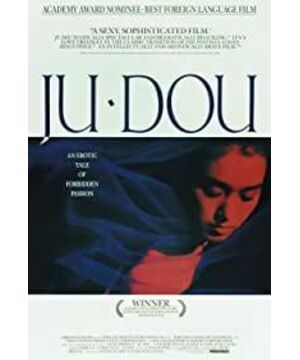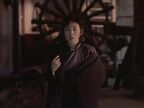Red "Judou" is a film directed by Zhang Yimou in the early days, and it is the second Zhang Yimou film that I have watched seriously. I just finished watching "Red Sorghum" yesterday, and now when I close my eyes, what comes to mind is the red covering the screen and Jiang Wen's blurred face submerged in the intense red. Only after seeing it did I realize that red can be used in a movie. Simultaneously represents multiple meanings. There is also a lot of red in "Judou". The deepest impression is that Judou and Tianqing are hiding behind the dyeing vat. Judou happily brings the red turban that Tianqing bought for her. A little bit of independence and freedom, a little bit of humanity, a little bit of true feelings, the meaning of life surrounded by bricks and tiles. It was a small flame that burned tenaciously under the suppression of feudal ethics, and finally turned into a raging fire. Women In China in the 1920s, the Qing Dynasty had just perished, but the feudal etiquette that had been followed for thousands of years was still poisoning the world, especially the shackles imposed on women, layer upon layer, women are just things, not people. Judou's experience should be a microcosm of the situation of Chinese women at that time. Although the film is already very miserable, comprador marriage, sexual abuse, being beaten, forced widowhood, hatred of sons, and finally dying in a sea of flames, but I think in real life women's survival The situation should be more tragic, after all, Judou still had love and was loved by others. From the beginning to the end, Judou is a woman who is strong and tenacious, has clear love and hate, and dares to resist feudal ethics. In contrast, Tianqing is simply the opposite of Judou, cowardly, cowardly, timid, and irresponsible. The love between him and Judou The reason why it can be produced is because the object of his comparison is the tyrannical and stingy incompetent uncle. In her small world, Judou will definitely choose Tianqing, and that kind of love is more inclined to be a kind of mutual pity between the weak. Love is a sense of resistance in the face of oppression and imprisonment. Did Tianqing save Judou? Absolutely not. It is precisely Judou's initiative, bravery, and perseverance that made her happy. Today, I also gradually understand how important an independent personality and a brave and fearless spirit are to women! Judou's son In fact, I haven't fully understood the meaning behind the character Tian Bai, who unintentionally and deliberately killed his nominal father and biological father (fathericide); he is clear about his mother and Tian Qing's affair, but at home, he does not Happy but tolerant, outside the house, when he hears gossip from others, he will kill with a knife (the family shame cannot be exposed); in the face of Judou's love and Tianqing's favor, his face is always expressionless, gloomy like a fog covering his face, Only when facing his nominal father, did he ever smile, once he called him Dad, and once he drowned as "Father" (inherited the feudal ethics and passed it on numbly). I have the above understanding while writing, so is Judou’s resistance a moth to a fire? As a continuation of her life, her son is numb and indifferent, his body is dark and dirty, he has no thoughts and no sympathy, and exists like a walking dead. Was he China at that time? Maybe I don't understand yet.
View more about Ju Dou reviews










